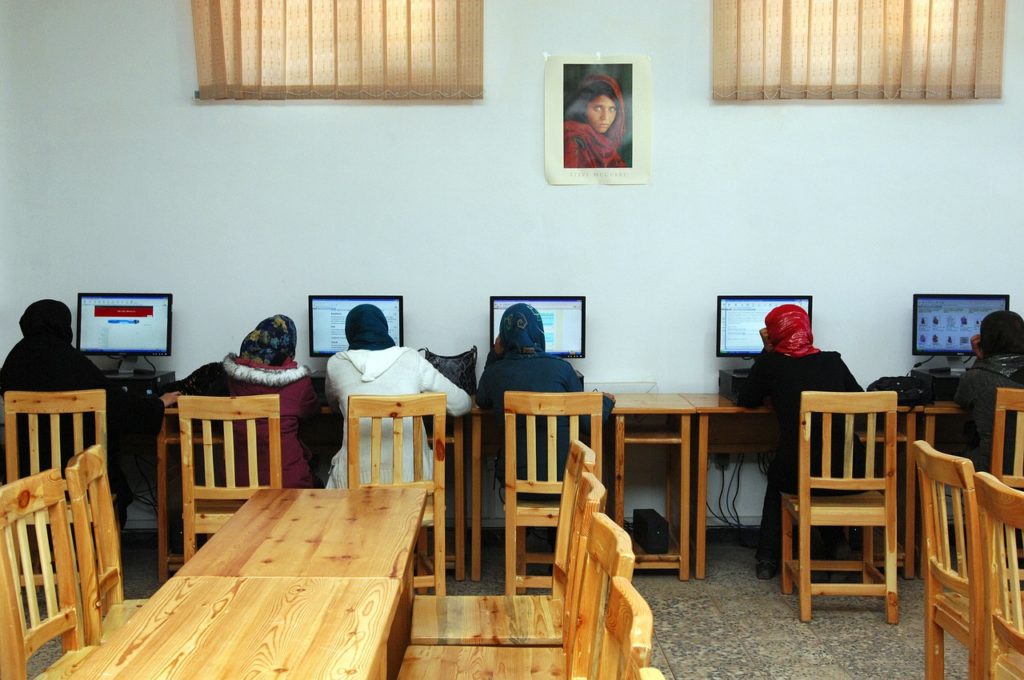Guided by its vision of a world free from poverty, exploitation, and discrimination, Building Resources Across Communities (BRAC) has been empowering poor and marginalized people and communities since it was established in Bangladesh in 1972. Today, BRAC is the world’s largest development organization, operating across 11 countries and touching the lives of one out of every 55 people on our planet.
BRAC has been working in Afghanistan since 2002, when it launched its first programs in post-conflict Kabul. Within seven years of its establishment in the country, BRAC was the largest NGO operating in Afghanistan, with a range of projects and initiatives focused on the following four priority areas:
Capacity development
 Improving the competencies of government, civil, and private organizations is a critical part of Afghanistan’s journey toward resilience and empowerment. To address this need, BRAC launched its capacity development program in Kabul in 2003. The program consists of a suite of training courses for people and institutions involved in Afghanistan’s development process, including government ministries, local and international NGOs, UN organizations, and donor agencies. The idea behind the program’s establishment was to help provide the agents of Afghanistan’s development with the necessary tools to carry out their mission more effectively and with the highest degree of professionalism.
Improving the competencies of government, civil, and private organizations is a critical part of Afghanistan’s journey toward resilience and empowerment. To address this need, BRAC launched its capacity development program in Kabul in 2003. The program consists of a suite of training courses for people and institutions involved in Afghanistan’s development process, including government ministries, local and international NGOs, UN organizations, and donor agencies. The idea behind the program’s establishment was to help provide the agents of Afghanistan’s development with the necessary tools to carry out their mission more effectively and with the highest degree of professionalism.
Designed to be engaging, participatory, flexible, and results-oriented, the training courses cover four key subjects: management and development, finance and accounts, health, and education. The capacity development program employs experienced professionals from around the world on both a part- and full-time basis to provide the best possible level of coaching to participants. As of September 2016, the program had developed 166 different course offerings and had provided training to over 61,000 people, of whom more than 19,000 were government and NGO staff.
Education
Reforming and improving Afghanistan’s education system is a major goal for the majority of local and international NGOs working in the country, and BRAC is no exception. BRAC’s education program actually reaches seven countries in total, making it the world’s largest private, secular education system; it was launched in Afghanistan in 2002.
In broad terms, the education program aims to bring systemic reform to Afghanistan’s schools and school system, working to improve students’ access to education and their academic performance. Using a community-based approach to education, BRAC schools offer a second chance to children who have been left behind by the formal education system due to barriers like poverty, displacement, discrimination, or violence.
Leveraging innovative teaching methods and materials, the BRAC system acts as a complement to Afghanistan’s mainstream school system through initiatives like need-based training and student mentoring. In addition, the community-based approach brings broader benefits, such as strengthening rural or isolated communities by providing them with their own school, and helping local governments become more aware of and more responsive to educational challenges.
In 2015 alone, BRAC opened 666 new community-based schools and 250 pre-primary schools. That same year, nearly 30,000 children graduated from 962 BRAC schools around the country. Teacher training is also an important part of BRAC’s education work. In 2015, 1,734 government school teachers received training from BRAC, as did 1,501 mentors working with students at 100 hub schools.

Health
Decades of civil conflict have severely compromised the delivery of health care services to Afghans across their country. Since 2002, BRAC has partnered with Afghanistan’s Ministry of Public Health to help the government provide basic health care services to its citizens, with a particular focus on achieving the UN’s sustainable development goals of reducing child mortality, improving maternal health, and fighting infectious diseases like malaria and tuberculosis. Afghanistan has one of the world’s highest rates of tuberculosis infections.
BRAC’s health program brings together services across the full spectrum of care, including preventive, promotive, curative, and rehabilitative initiatives. Using trained frontline community health promoters, BRAC works to bridge the gap between underserved communities and formal healthcare systems, thus making it easier for disadvantaged, socially excluded, and isolated populations to access the basic care they need. In 2015, an estimated 1.3 million Afghans received health care through BRAC initiatives.
Rural development
Since 2003, BRAC has worked as a facilitating partner with Afghanistan’s Ministry of Rural Rehabilitation and Development (MRRD) on its National Solidarity Program (NSP). Created to address some of the most severe problems affecting Afghan infrastructure—including a lack of capacity, in terms of both personnel and knowledge, at grassroots administrative bodies—the NSP seeks to empower and support Afghan communities in identifying, planning, managing, and monitoring their own development projects. A key aspect of the NSP is facilitating the democratic election of community development councils, who play an integral role in launching projects in their own communities.
Already MRRD’s biggest community development initiative in Afghanistan, the NSP is also reputed to be the second-largest program of its kind in the world. BRAC supports the NSP by assisting community development councils with all aspects of their projects, including the use of NSP block grants intended for rural infrastructure development, and connecting these projects with other potential funding sources. In 2015, 614 infrastructure sub-projects were completed, and eight-month training programs were provided to more than 10,000 members of community development councils.
